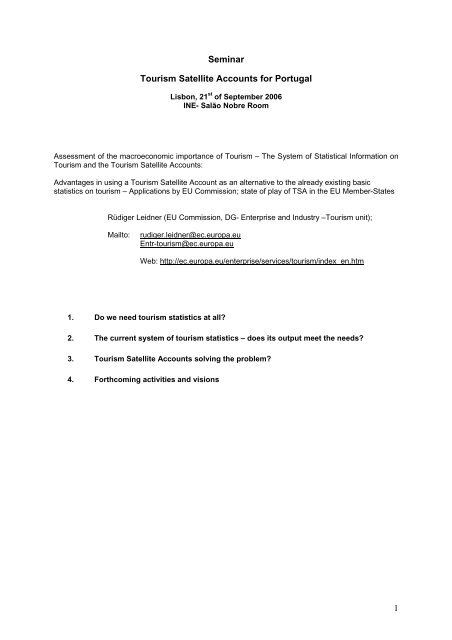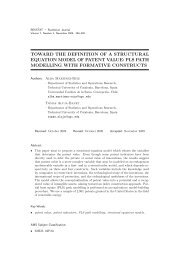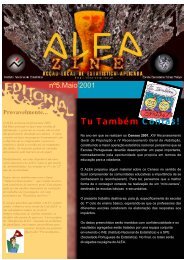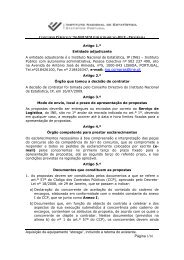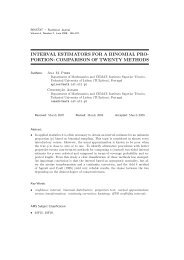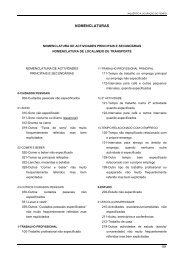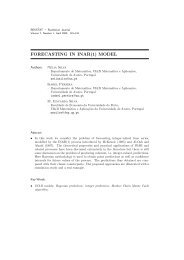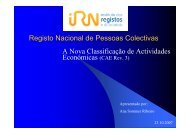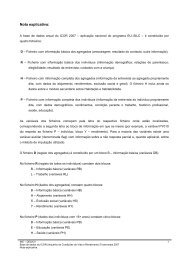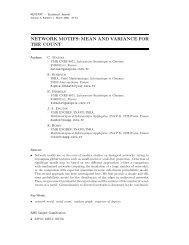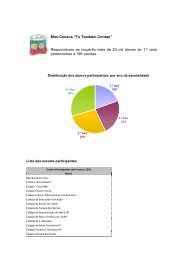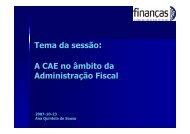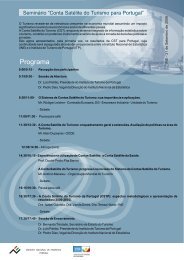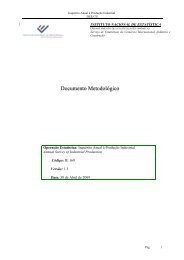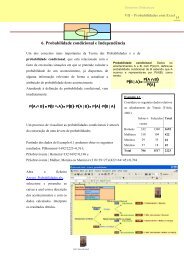1 Seminar Tourism Satellite Accounts for Portugal
1 Seminar Tourism Satellite Accounts for Portugal
1 Seminar Tourism Satellite Accounts for Portugal
Create successful ePaper yourself
Turn your PDF publications into a flip-book with our unique Google optimized e-Paper software.
<strong>Seminar</strong><br />
<strong>Tourism</strong> <strong>Satellite</strong> <strong>Accounts</strong> <strong>for</strong> <strong>Portugal</strong><br />
Lisbon, 21 st of September 2006<br />
INE- Salão Nobre Room<br />
Assessment of the macroeconomic importance of <strong>Tourism</strong> – The System of Statistical In<strong>for</strong>mation on<br />
<strong>Tourism</strong> and the <strong>Tourism</strong> <strong>Satellite</strong> <strong>Accounts</strong>:<br />
Advantages in using a <strong>Tourism</strong> <strong>Satellite</strong> Account as an alternative to the already existing basic<br />
statistics on tourism – Applications by EU Commission; state of play of TSA in the EU Member-States<br />
Rüdiger Leidner (EU Commission, DG- Enterprise and Industry –<strong>Tourism</strong> unit);<br />
Mailto: rudiger.leidner@ec.europa.eu<br />
Entr-tourism@ec.europa.eu<br />
Web: http://ec.europa.eu/enterprise/services/tourism/index_en.htm<br />
1. Do we need tourism statistics at all?<br />
2. The current system of tourism statistics – does its output meet the needs?<br />
3. <strong>Tourism</strong> <strong>Satellite</strong> <strong>Accounts</strong> solving the problem?<br />
4. Forthcoming activities and visions<br />
1
This contribution regards the system of tourism statistics not from an expert’s or a statistician’s point of<br />
view, but takes the user’s view.<br />
Users of statistical data concerning tourism are not only to be found in governments and international<br />
institutions such as the European Commission, the World <strong>Tourism</strong> Organisation and the OECD, but<br />
also in the national and regional tourist organisations as well as the tourism industry and research<br />
institutes.<br />
1. Do we need tourism statistics at all?<br />
It sounds maybe strange to you to ask this question in a country like <strong>Portugal</strong> where<br />
tourism is of high economic importance. But in the years that I have been working in the<br />
European Commission, I was sometimes asked whether tourism statistics on European<br />
level are really necessary.<br />
The background <strong>for</strong> this question on the necessity of European tourism statistics may be<br />
the circumstance that the Treaty as well as the new Constitution give the Community only<br />
a complementary and coordinating function in the field of tourism. The Community shall<br />
complete and coordinate activities of the Member States.<br />
Some who read these sentences in the Treaty or the Constitution thus ask the question<br />
why we need tourism statistics at all.<br />
Regarding the question <strong>for</strong>mally I could say that all statistical data are collected in the<br />
Member States and transmitted to Eurostat. In this respect all the activities of Eurostat<br />
based on the <strong>Tourism</strong> Statistics Directive 1 including the ef<strong>for</strong>ts to harmonise the data<br />
collection are clearly in compliance with the legal competencies atributed in the Treaty.<br />
But, not only because I am an economist, I do not want to restrict my answer to a <strong>for</strong>mal<br />
view only. Finally, coordinating activities in the field of tourism is not a goal in itself: The<br />
constitution clearly says that the Community shall coordinate activities of the Member<br />
States to promote Europe as tourist destination and to improve the competitiveness of the<br />
European tourism industry.<br />
From my point of view these two objectives of EU tourism policy are the real base <strong>for</strong> a<br />
system of tourism statistics. For nobody can tell me, how these objectives could be<br />
achieved without having in<strong>for</strong>mation on the current situation, short-term and long-term<br />
developments and <strong>for</strong>ecasts.<br />
And how should I evaluate the impacts of external events. It is not a Tsunami that must<br />
happen to raise the question how the European tourism industry will be affected. This<br />
question also arises in the context of policy measures, on national as well as EU and<br />
1 COUNCIL DIRECTIVE 95/57/EC of 23 November 1995 on the collection of statistical in<strong>for</strong>mation in the field of tourism<br />
2
international level. When a Commission service proposes a new activity, it has to submit<br />
an impact analysis of it. But without statistical data I could never assess the impact on<br />
tourism.<br />
Without a statistical system I would have to commission a research institute <strong>for</strong> that<br />
purpose. That would be costly in two respects: with regard to budgetary means as well as<br />
the time that passes.<br />
2. The current system of tourism statistics – does its output meet the needs?<br />
The second part of my answer to question N° 1 clearly indicates that tourism statistics is<br />
not a purpose in itself, it is the usability <strong>for</strong> the purposes of the users that make them<br />
valuable.<br />
Even though it is evident <strong>for</strong> everybody that the possible use of statistics above all<br />
depends on factors such as quality and timeliness I do not want to focus on that, <strong>for</strong> these<br />
are issues that are related to statistical data in general and not particularly of tourism<br />
statistics.<br />
I already pointed out that the need to use statistical in<strong>for</strong>mation on tourism arises quite<br />
often in the Commission. One reason is the reporting on the per<strong>for</strong>mance of the industry,<br />
others are the evaluation of the impact of the activities of other Commission services.<br />
One of the most recent examples is the amendment of the Timeshare Directive by the DG<br />
charged with consumer protection. In this case it would have been very helpful to have<br />
official statistical data on that industry. But according to the <strong>Tourism</strong> Statistics Directive on<br />
the supply side only the HORECA sector (hotels, restaurants, cafes; NACE H) and tour<br />
operators and travel agents (NACE I.633) are covered.<br />
Similar problems arose and arise, <strong>for</strong> example, with regard to activities in the area of<br />
transport, eg. air travel.<br />
Besides this more or less “legal problem” that the industries just mentioned are not listed<br />
in the <strong>Tourism</strong> Statistics Directive, these examples shed light on the most apparent<br />
problem, the lacking definition of the sector.<br />
On the demand side we at least have a commonly accepted definition: A tourist is<br />
somebody leaving his/her usual environment <strong>for</strong> not more than 12 months consecutively.<br />
This definition is not operational as the presumably never-ending discussions on the term<br />
“usual environment” show, but at least there is a definition.<br />
On the supply side, however, there is only a practical agreement that the accommodation<br />
and gastronomy sector as well as tour operators and travel agents belong to the tourism<br />
sector.<br />
3
The question may be raised, why data on restaurants and even canteens are collected,<br />
but not on air travel, rental cars, souvenir shops etc. The list of sectors dependent or<br />
affected by tourist expenditures could be prolonged ad infinitum.<br />
Subsequently and because of the data availability in most cases the HORECA sector is<br />
considered as synonym <strong>for</strong> “tourism sector”. This restriction of the view on the tourism<br />
sector seems reasonable at a first glance when the number of enterprises are taken into<br />
account. The vast majority, about 95 %, belong to the HORECA sector and only around<br />
4 % are travel organisers.<br />
But the number of enterprises does not correspond to their economic importance as far as<br />
turnover or employment is concerned. The 4 % tour operators and travel agents, <strong>for</strong><br />
exampl, yield nearly 30 % of the turnover in the sector, whereas the 95 % HORECA<br />
companies yield the remaining 70 %.<br />
These figures refer to the EU-25 average. In individual Member States – even more on<br />
regional level - the economic importance of these two groups of tourism enterprises varies<br />
considerably.<br />
The examples show that it is not easy to analyse the tourism sector, its per<strong>for</strong>mance and<br />
weaknesses, with the currently available statistics. When this is true with regard to the<br />
sector itself, its branches and sub-branches, it must be even more difficult, I should rather<br />
say impossible, to compare the tourism sector with other branches, not to mention the<br />
macroeconomic level.<br />
For besides a comparably simple analysis of the per<strong>for</strong>mance of the tourism sector and its<br />
structural changes we also have to assess industries in a political context, <strong>for</strong> example,<br />
their contribution to the growth and employment goals of the Lisbon strategy.<br />
But how should one measure the contribution of an industry to GDP and macroeconomic<br />
employment when the respective sector does not appear in the System of National<br />
<strong>Accounts</strong> (SNA)<br />
4
Other policy areas lead the way<br />
The first time I encountered the term “<strong>Satellite</strong> System” was in the context of measuring<br />
and evaluating economic activities with regard to their impact on the environment. The<br />
challenging task was to find figures on a highly aggregated level that mirror<br />
environmentally relevant activities and the economic importance/impact of those activities<br />
respectively environment protection <strong>for</strong>/on the economy. Similar systems were established<br />
later in other areas as well, eg. Sports.<br />
3. <strong>Tourism</strong> <strong>Satellite</strong> <strong>Accounts</strong> solving the problem?<br />
<strong>Tourism</strong> is one of the perfect examples <strong>for</strong> worldwide economic activities. Taking the<br />
global dimension of tourism into account, it was clear from the very beginning, that the<br />
establishment of national <strong>Tourism</strong> <strong>Satellite</strong> <strong>Accounts</strong> (TSA) would prerequisit<br />
internationally harmonised systems to make the results comparable.<br />
For this reason international organisations (UN, UNWTO, OECD) developped a<br />
framework 2 which was adapted by Eurostat to some pecularities of tourism in the EU. 3<br />
Because of the fact that, as pointed out at the beginning, tourism policy is a competency of<br />
the Member States and not the Community, the Commission in 2002 launched a grant<br />
programme to promote the establishment of national TSAs in Member States.<br />
Member States applying had the choice between carrying out a feasibility study, setting up<br />
a TSA or updating an existing one or carrying out a project in trans-border cooperation<br />
with another Member State.<br />
In the first round (final reports 2003) 4 Member States participated:<br />
- Belgium, Germany, Italy, Netherlands.<br />
Because of the obvious reluctance of most Member States, some Member States did not<br />
participate because of lacking experience in such a complex and technical project, a<br />
second round was launched in 2003.<br />
9 Member States participated and presented their final reports in 2004:<br />
- Malta, UK and Ireland, Hungary, Denmark, Italy, Belgium, Slovenia, Finland and<br />
<strong>Portugal</strong>.<br />
2 Handbook of national accounting: Integrated environment and economic accounting, New York 1993<br />
3 Eurostat, European implementation manual on tourism satellite accounts (TSA), Lux. 2001<br />
5
Because the new Member States did not have sufficient opportunity to participate in this<br />
programme in 2005 a third round was announced <strong>for</strong> which 7 Member States submitted<br />
proposals:<br />
- Slovenia, Czech Republic, Cyprus, Poland, Austria, Belgium and Netherlands.<br />
The final reports of this round are expected in 2007.<br />
Conclusions from the three rounds of the grant programme<br />
Let’s assume that all participants of this third and certainly final round will submit final<br />
reports that will be accepted by the respective Commission services (Eurostat and<br />
DG ENTR). What did we achieve?<br />
Since 2 of the 15 participating countries (Malta and Ireland) presented feasibility studies<br />
only and did not make the step yet to establish a national TSA, we persuaded 12 Member<br />
States by this programme to establish a TSA. For Austria (participating in round 3) and<br />
Spain developped their first national TSA outside the programme.<br />
But only Austria and Spain update their TSA regularly. In all the other cases we have<br />
national TSAs based on data between 1999 and 2001.<br />
This may be considered sufficient to analyse and compare the structure of the tourism<br />
sector between industries and Member States. But without regular updates this<br />
in<strong>for</strong>mation certainly will lose value.<br />
4. Forthcoming activities and visions<br />
1) Stimulating the updating of TSAs<br />
Many Member States that participated in the grant programme hold the view that it<br />
would not be necessary and too costly to collect the data needed <strong>for</strong> an update<br />
annually. Since the <strong>Tourism</strong> Statistics Directive had to be amended because of the<br />
enlargement of the Community anyway, Eurostat presented a proposal to update also<br />
the list of statistical items <strong>for</strong> data collection and to include the most important data <strong>for</strong><br />
an estimation of TSAs in Member States.<br />
If the Member States accept this proposal, it would allow us to undertake the ef<strong>for</strong>t of a<br />
full TSA calculation not every year, but perhaps every third or fourth year and to publish<br />
estimated TSA figures in between.<br />
A new legal base <strong>for</strong> tourism statistics that includes the data collection <strong>for</strong> estimated<br />
TSAs could on the one hand respect the cost arguement and on the other hand serve<br />
the in<strong>for</strong>mation needs of the users. For, as I already pointed out, in the context of policy<br />
6
activities on a macroeconomic level such as the Lisbon strategy such data are<br />
indispensable.<br />
That’s why I invite all Member States and their delegates in the respective Working<br />
Group at Eurostat to agree to that proposal.<br />
2) Regionalised TSA<br />
<strong>Tourism</strong> is not only an activity that takes place in a global dimension. Because of the<br />
spatial immobility of the vast majority of its enterprises (besides the HORECA<br />
companies also the attractions) it has as well a typical regional or rather “destinational”<br />
dimension.<br />
For this reason some countries, in the Community up to now only Austria, began to<br />
establish regionalised TSAs.<br />
In the passed years I had the opportunity to attend meetings of the UNWTO where<br />
UNWTO members such as Canada presented their approaches in that field. I<br />
appreciate very much that UNWTO continues to promote the furhter development of<br />
TSAs.<br />
From my point of view regionalised TSAs will become the most important element of the<br />
whole TSA discussion, in particular in the Community.<br />
For we should take into account that tourism is one of the most outstanding activities<br />
that does not stop at national borders, the less in a Community with totally open<br />
borders. Some of the regions and destinantions are trans-border regions. For these<br />
regions/destinations a “regionalised TSA is of much more importance than national<br />
Tsas respecting the borders of the national territory.<br />
Of course, regionalised TSAs involve some problems with regard to their aggregation to<br />
a national TSA. But taking into account the progress made outside the Community as<br />
presented in UNWTO meetings I would like to invite all Member States to follow.<br />
3) A user’s vision<br />
Allow me to conclude with some remarks that clearly go beyond the borders of official<br />
statistics.<br />
In my introductary remarks I pointed out that one purpose of statistical data is to<br />
facilitate to assess the possible impact of so-called “external shocks”. This term does<br />
not only comprise catastrophies such as terrorist attacks or earthquakes, it refers to any<br />
event outside a system such as the tourism sector, i.e. policy measures such as<br />
variations of tax rates or the accession of new Member States are also included.<br />
7
Let me assume that one day we would have national TSAs in all Member States fed<br />
with the most recent data available.<br />
In such a dreamlike situation it would certainly be easier to carry out an impact analysis<br />
on a quantifyable basis. But would it not be much more efficient to have a simulation<br />
modell <strong>for</strong>med with TSA data?<br />
This is not an utopian dream. Simulation modells <strong>for</strong> the tourism sector already exist,<br />
but they are not based on TSA.<br />
Having a simulation model <strong>for</strong> the tourism sector would allow us to predict the impact of<br />
many developments or events on the tourism sector.<br />
This is my vision <strong>for</strong> the furhter use of TSA in the offices of all stakeholders, my vision<br />
and my concluding remark as well.<br />
8


